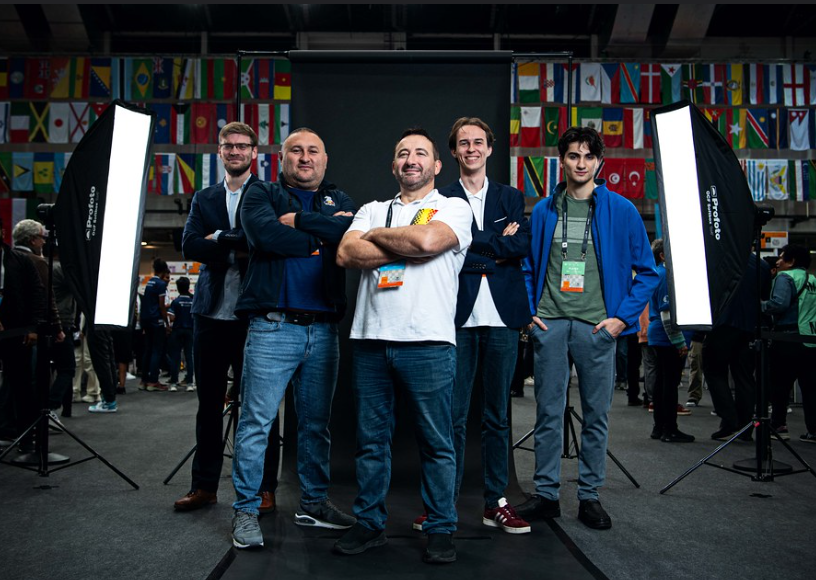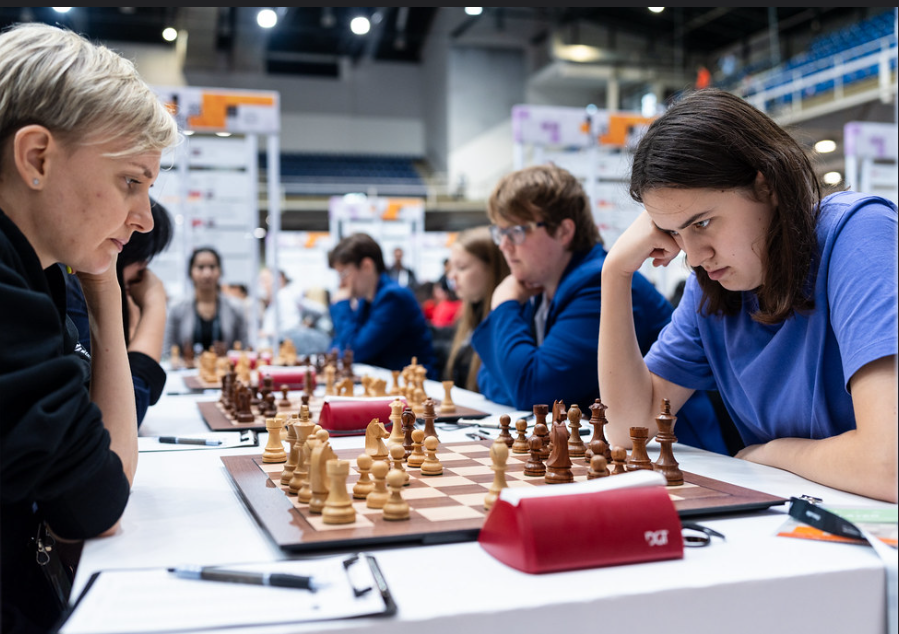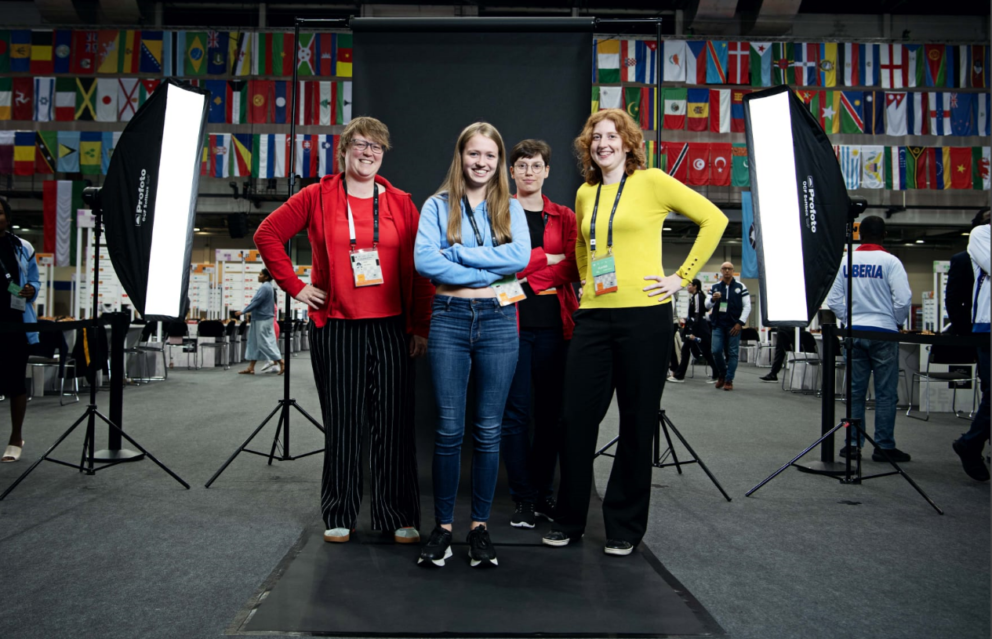Philippe Vukojevic 19.09.2024
Chess to get out of misery… it could easily have been a theme at the Global Chess Festival organised for the 10th time by Judit Polgar yesterday and the day before yesterday, but it was reality after the First World War. On 6 November 1921, the Hungarian Chess Federation MSSZ was founded at the Budapest Chamber of Industry and Commerce (Szmere Street V, 6) as a representative of the 10 chess clubs that Budapest had at the time. Over the past 103 years, the seat would change its address some 16 times within the Hungarian capital.
In any case, that year marked the start of a series of major tournaments, the first of which took place at the Gellért-Bades concert hall. There, Aljechin, the eventual winner of the tournament, is said to have played the defence named after him for the first time.
In 1924, under the leadership of chess federation president Istvan Abonyi, Hungary was among the 15 countries that were to found FIDE in Paris. That president, incidentally, had already earned his chess spurs a decade or so earlier by analysing the Budapest defence (they do not talk about a gambit here) with Breyer and Barasz, and Maroczy had successfully tested those analyses in a famous 1918 game against Rubinstein.
Abonyi would also put Hungary on the map through other tournaments: Györ 1924, Debrecen 1925, Kecskemét 1927. Here we should also mention the names of Laszlo Toth (1895-1964) and Ferenc Chalupetzky (1886-1951) who organised the chess scene in the countryside, but were also tireless chess writers. Their tournament books, including on the aforementioned tournaments, and their editorial work for Magyar Sakkvilag (from 1922 to 1950) are invaluable to the chess world.
Budapest continued to organise events: in 1926, even the second (unofficial) Chess Olympiad where… four teams participated and where the Hungarians showed themselves to be the strongest. Also new was the Hungarian women’s tournament that took place simultaneously with the Olympiad at the Hotel Gellért. It is said that the spectators – fascinated by the ladies – often just whispered moves, but more on that later.
In the same year, Grünfeld won a tournament, and from 1928 Capablanca would regularly come to win tournaments in Budapest. Hungary’s golden chess days would come to an end in 1934 with the Ujpest tournament, where the 23-year-old victor, Andor Lilienthal (about whom Quality Chess has just published the book ‘Chess Survivor’) ended Capablanca’s invincibility.
But before we complete Budapest’s history, I would like to make a jump to the present. OK, the number of participants is slightly higher at the Olympiads in 2024 than in 1926, and this year’s home team will surely not win the event. The anti-cheat measures here also seem to make any cheating impossible: you may have already read that two players have already been caught ‘cheating’, although it is not perceived that way here. One allegedly had a sim card, the other an analogue watch. All my congratulations to that second player, by the way: how did he get through three electronic scans without his watch being detected? It was only late in the game that an arbiter noticed the watch: in fact, while thinking about his move, the player had rolled up his sleeves and then – elbows on the table – supported his head with his hands. Those who really want to cheat will not display their ‘device’ so openly, it seems to me.
Incidentally, I myself was asked to explain the presence of my cards my wallet: hotel key, Delhaize card, ID, driver’s licence and bank cards… Fortunately, I did not have a SIM card with me.
Despite the big ‘fair play show’, I made the reflection that cheating here can be done the ‘good’, old-fashioned way: by whispering. Many coaches and players do whisper some things to each other: a goodbye, a how-are-your-wife-and-children-doing, a that’s-long-ago-we’ve-seen-each-other, a you-know-who-I-just-meet… And a have-you-been-thinking-about-Ng4 is a bit less innocent, but in many cases – given the level of many players – it wouldn’t really be of decisive importance. Lesser gods, incidentally, do get a quick reprimand when whispering by the orange dressed volunteers in the playing room, but with the greats it is a little different. A few days ago, for instance, Carlsen entered the tournament hall without his ‘green card’, the entry card for players, so he did not have to wait for the captain to bring them out to him. And whispering between the greats is also tolerated here a little longer than with all the noble unknowns. Strange, isn’t it? Because with Radjabov, Kramnik, Sokolov and Gurevitch, you have captains here where you would naturally pay a little more attention to a have-you-been-thinking-about-Ng4.

39.Ng4 – not whispered in by the captain, by the way – Sim had better not have done so, because after that he had no time to do another Houdsimie-trick. With Mher, everything went according to plan: a mistake was quickly punished, but although he made things quite difficult for himself in the endgame when he gave up his a-pawn, he took the full point. A bit of the same scenario with Lennert: a few mistakes by the opponent were punished. Only, Lennert didn’t let him get back into the game at all. Well, a 2-1 lead with only Thibaut left, but after 39…b4 it was to be feared that Thibaut would return home empty-handed again. Fortunately, the game had another plot change and from being a piece behind, he eventually ended up in a won endgame. Thibaut’s sigh of relief was audible five kilometres away, at the Intercontinental Hotel where the Educational Chess Summit was taking place. A fine 3-1 score from a Daniel-less team. Are we going for a brilliant second half of the tournament?
Among the ladies, there was very bad news even before the first move was played: Diana had been hospitalised with an infection the evening of the rest day. So, the team will basically have to finish the second tournament half with the same foursome. We wish Diana a speedy recovery in advance!

Elo-weak teams had not posed any problems until now, but it was clear that things might be different against New Zealand. Hanne lost a pawn, although it was certainly not dramatic: she was able to activate her pieces. With her rooks on two open lines and a splendid knight on d5, she overpowered the white position and the end was almost a perfect ‘Zugzwang’ position despite the presence of rook and queen and still many pawns. So a zero period ended for her too and we can look forward to the second half of the tournament with a smile.
Sarah had punished a mistake by her opponent, but the tactical entanglements that followed gave her opponent incredible compensation. And since Sarah is not a computer, she lost her material back. A draw seemed likely until Sarah again failed to find the best move, but fortunately her opponent chose eggs for her money and absolutely wanted to defend her a5 pawn, rather than give it up and let her pair of pawns on the d- and e-file advance to a win.
With Daria and Tyani too, a draw seemed in the making.
In Tyani’s case, the game had seen shuffling for a long time, with the occasional piece exchanged and the position had always been equal. Only, in the time trouble phase, on move 39 the opponent gave a stupid check with her knight and although Tyani – also in time trouble – did not immediately find the best move, she got a second chance on move 40. And then she saw it. The white knight had got itself into trouble as the number of available squares had become minimal and the steed would eventually be trapped on the king’s wing. The free pawn the New Zealander still created on the queen’s side came too late, as Tyani was able to easily stop it with her knight. That makes 5 in a row for Tyani, 6.5/7 in total and the second highest TPR of all Belgians (only Daniel Dardha does better).
With that victory, the match was won and we could hope for more. Daria had been pressing throughout the match and constantly had a slight advantage. She (unfortunately) transposed to a rook endgame as she would win a pawn. That ‘unfortunately’ is there for two reasons: on the one hand, she could have made the endgame even more favourable by activating her king a bit more and breaking apart her opponent’s pawn chain a bit more. On the other hand, despite the plus pawn, the rook endgame was not really won. On the contrary, the opponent was able to activate her rook, so Daria would have to play very carefully to save it. But after again more than 4 hours of play, that was not so obvious, and she ended up losing.

Maybe, we could have had more points, but with two team wins we can really be satisfied. Today awaits the 2nd Hungarian team for the men, Austria for the women.

Philippe Vukojevic 15.09.2024
‘Budapest is the most beautiful city in the world,’ I read in an article by Laszlo Jakobetz. Judit Polgar also…
Read more